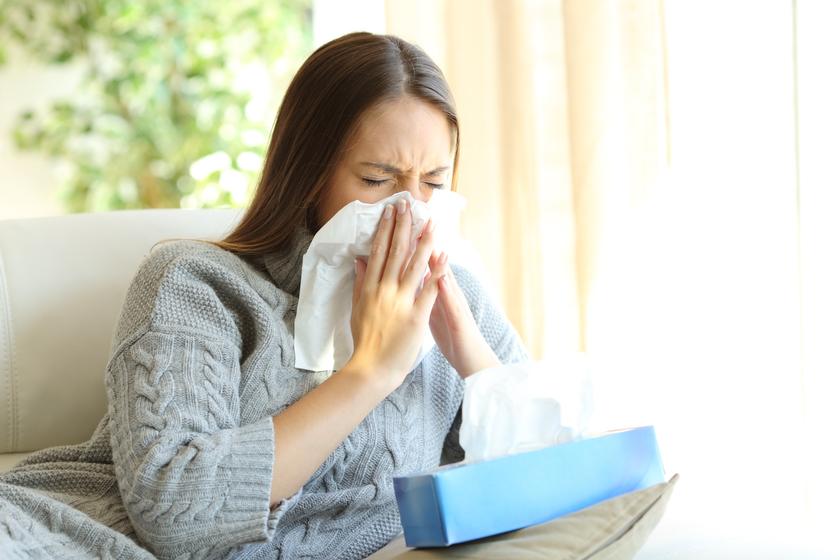How to Get Rid of Congestion

By: Katie McCallum
If you're someone who always has tissues on hand, you already know how distracting, uncomfortable, irritating and inconvenient a stuffy nose can be. Nasal congestion can affect everything from your sense of taste and smell to your ability to sleep and concentrate.
The most well-known culprits are allergies, sinus problems and respiratory illnesses, such as colds, the flu and COVID-19. But many different things cause it.
"Living in Houston, a lot of my patients say they have baseline congestion," says Dr. Ran Wang, an ear, nose and throat specialist at Houston Methodist. "They've lived with it for so long that it's almost become their natural state."
You shouldn't have to. After all, the various causes of congestion are treatable — though, in some cases, you'll need to get to the bottom of what's triggering it.
Why does congestion happen?
Ever wonder why congestion is worse at night? The answer helps explain why it even happens in the first place.
"A certain amount of nasal congestion on one side of the nose is to be expected," says Dr. Wang. "The nose has a nasal cycle, in which each side takes turns receiving the most airflow."
The side receiving more air typically switches every few hours, which is why one side might feel more congested when you lay on your side to sleep at night. This also explains why congestion sometimes switches nostrils.
This type of nasal stuffiness is normal, fleeting and should feel clear by the morning. If it doesn't, a larger issue may be at play.
"A lot of people talk about allergies, sinus pressure and nasal congestion as separate issues, but they can be variants of the same problem," says Dr. Wang. "Something is limiting how air is moving through the nose, and that can usually be traced back to three things."
The three things that lead to nasal congestion:
- Anatomic obstruction – when the nasal septum is pushed to one side, causing the airway to be more narrow on that side
- Soft tissue swelling – when infection or irritants — dust, pollen, pet dander and smoke, for instance — trigger inflammation inside the nose, narrowing nasal passageways
- Mucus production – used as a defense mechanism to help clear infection or irritants away faster, mucus can also leave your nose feeling plugged up
Sometimes, the explanation to why these things are happening is pretty obvious: perhaps a cold has been making its way through the office or maybe high tree pollen levels are causing your allergies to flare up. Other times, the reason for congestion might be more mysterious.
"Our first step is to distinguish if the congestion is due to anatomic obstruction, soft tissue swelling or excess mucous drainage," says Dr. Wang. "For many patients, it's a combination of all three."
What works for congestion?
Regardless of whether or not you know why you're congested, you're probably ready to try anything to get relief. The ways to get rid of congestion range from home remedies to over-the-counter medications, and Dr. Wang recommends starting with a nasal saline rinse as a simple first step.
"A saline rinse helps clear your nose of excess mucus," says Dr. Wang. "You can use these rinses as many times per day as you need, but do be sure to use distilled water or water you've boiled and allowed to cool to room temperature."
Nasal saline rinses might be enough to help manage a minor head cold or acute sinus infection. But since they contain no medically-active compounds, they don't offer the long-term congestion relief needed for more severe symptoms. In these cases, Dr. Wang recommends pairing saline rinses with a nasal spray.
"Nasal steroid sprays are good for controlling drainage, while nasal antihistamines are an especially good option if you feel obstructed," explains Dr. Wang. "Use the saline rinse first, and then use one puff of the steroid spray in each nostril, two times per day."
Nasal decongestant sprays can also help clear congestion, but beware: They shouldn't be used for more than two to three days. Any longer and you run the risk of developing rebound congestion.
"Oral allergy medications can be helpful if you have more allergy symptoms than just nasal congestion, such as itchy, watery eyes, sneezing or coughing," adds Dr. Wang.
What doesn't work long-term are the oral decongestants that contain phenylephrine as the active ingredient. This is one of the most popular types of decongestants found in multi-symptom cold medications, but the FDA has stated that oral phenylephrine doesn't work to relieve congestion, and taking these over time can cause increases in blood pressure. You'll want to try one of the other recommendations listed above instead.
What to do when congestion won't go away
The most common causes of congestion are either temporary or manageable. Cold symptoms typically improve within 7 to 10 days. Seasonal allergies can usually be kept at bay with the remedies listed above. But what causes congestion that won't go away?
Reasons to see a doctor about nasal congestion include if it:
- Persists longer than eight weeks
- Doesn't improve after a month of consistent use of an antihistamine or nasal steroid spray
- Is accompanied by signs of acute sinus infection, including facial pressure, fever and decreased sense of smell
"Your doctor will collect information about your symptoms — which you experience, what they feel like and when they occur," says Dr. Wang. "We're looking for the cause, since we need an accurate diagnosis to effectively treat nasal congestion."
The potential causes of chronic congestion range from untreated seasonal allergies to more complicated problems like deviated septum, chronic sinusitis and vasomotor rhinitis.
"If congestion is always worse on one side, we start thinking about an anatomic cause of nasal obstruction, like deviated septum," explains Dr. Wang. "Vasomotor rhinitis, which becomes more common with age, is when nerves inside the nose become less sensitive and mucus production is triggered when it's not needed."
These more complex causes of congestion warrant the expertise of an ear, nose and throat specialist.
"Sometimes it's allergies, but sometimes it's not," says Dr. Wang. "Once we can determine the underlying reason for congestion, we can start thinking about the various treatments, such as oral medications, immunotherapies, surgical procedures and more."

















